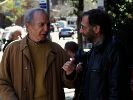Eye For Film >> Movies >> Gazzara (2012) Film Review
The opening scene of Gazzara establishes its tête-à-tête style: Ben Gazzara (1930- 2012), an actor of considerable esteem, performs a short sketch to a spectacular theatre hall that is empty but for one sole audience member, Joseph Rezwin, who claps heartily in response. As he tells us in voice-over, Rezwin first met Gazzara in 1976, when he landed his first professional role in the film industry working on John Cassavetes’s Opening Night. For the purpose of this documentary, he met with Gazzara over several days in New York, to muse on the actor’s life, career, achievements and fears as he headed towards his final battle against pancreatic cancer.
The subject of death is broached early, in fact. Gazzara walks past the hospital where his dad died, and soon after tells Rezwin that his first confrontation with death was when a friend jumped into a river and subsequently drowned. At the same time, death might be seen as a starting point for his acting career: when his bawdy Aunt Ida died of cancer when he was aged 15, he remembers, he played truant from school for 46 days in a row, in order to go to the cinema; consequently, he became “tunnelled into this idea [of acting]”.

Rezwin uses footage of Gazzara’s screen performances sparingly, though we do see him as murder defendant Manion in Anatomy Of A Murder (1959), and as Jocko De Paris in The Strange One (1957). Effortlessly naturalistic, his performances were also indefinably intense. In Husbands (1970), he pulls off drunken affection with a palpable sense of both inner hurt and inexpressible love. You get the sense, furthermore, that for Gazzara acting itself was a means of channelling certain gestures and feelings that the awkwardness of everyday real-life denied. Unsurprisingly, then, the actor appears in Rezwin’s film to be as shy as he is sensitive; “I was a melancholy boy”, he says, “a loner”.
Rezwin is a clear admirer of Gazzara, and readily admits to him, in the film’s final sequence (a stroll through Central Park, beautifully captured by DoP Trevor Tweeten), that he might have wanted to make the documentary simply as a means of getting to hang out with the actor. This personal perspective might account for the film’s overall and admirable avoidance of those limitations that commonly characterise actor biographies.
Gazzara himself is fully aware of the bullshit that pervades show business, and with bursts of actorly energy he frequently mimics the kind of schmaltz with which too many career overviews are romanticised. Smelling myth at the mere mention of Jimmy Stewart, for instance, he feigns the rhetoric of a chat-show guest and declares “he was the best human being I ever worked with” – and then repeats the line in reference to Lee Remick and George C. Scott. It’s clear that even if he did feel a certain respect or even love for such contemporaries, Gazzara considers verbalising such emotions to be somehow falsifying or weakening them (as wife Elke tells Rezwin, “Ben doesn’t talk much, he’s Sicilian”).
Down to earth till the end (“what made you wanna make a film about me?”), Gazzara indulges the women and men who ask for his photograph and autograph in the street, and who tell him repeatedly that they’ve “seen all of [his] films” (which somehow never quite rings true). Remaining unvocal, Gazzara seems to take such claims with a pinch of salt, though later in the film, when he is told the title of a movie, his reply, in that same feigned chat-show voice, is telling: “Oh that was great, I never saw it.”
Reviewed on: 01 May 2013
















